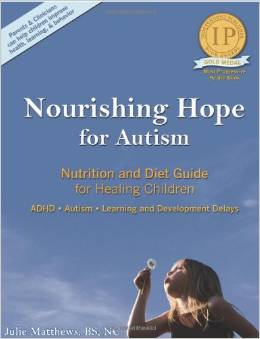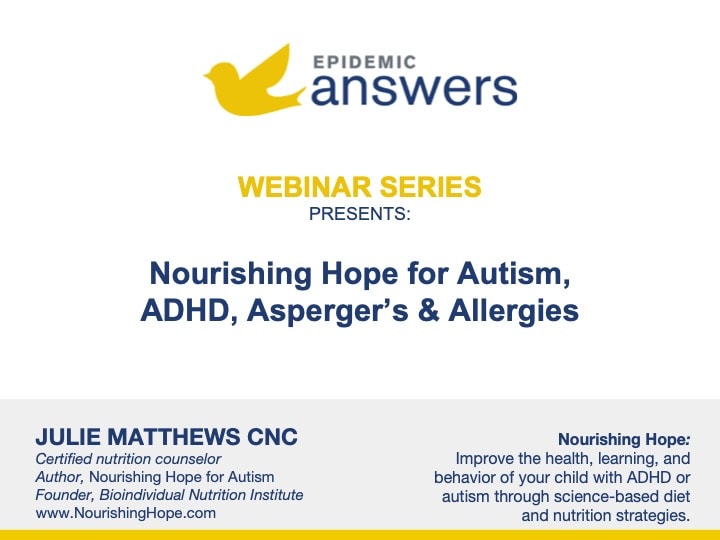The Specific Carbohydrate Diet may help children with autism, ADHD, asthma, allergies, autoimmune disorders and more because many of them have gut problems, food sensitivities, poor digestion and/or malabsorption. A medical-research study found altered intestinal permeability (“leaky gut“) in 43% of patients with autism, but not in any of the controls. Leaky gut leads to vitamin/mineral deficiencies, inflammation and toxins in the bloodstream.
For parents of these children, their gastrointestinal problems are a major concern. Those wishing to pursue detoxification for their children must wait until their children‘s gut pathogens are under control.
Autism online discussion groups host frequent discussions on gastrointestinal issues, with prescription drugs and natural remedies as common topics.
Many swear by the gluten- and casein-free (GF/CF) diet. Some have combined it with yeast-free or anti-yeast diets as well as prescription and over-the-counter anti-fungal remedies. The Specific Carbohydrate Diet may be “the answer” to the chronic microbial problems these kids face.
What Is the Specific Carbohydrate Diet?
To thoroughly understand and implement this diet, it is imperative to read Breaking the Vicious Cycle: Intestinal Health Through Diet by Elaine Gottschall. Gottschall details the progression of allowed foods as well as providing many delicious recipes.
How Is SCD Different from GF/CF?
The Specific Carbohydrate Diet is intended to stop the vicious cycle of malabsorption and microbe overgrowth by removing the source of energy to the microbes: sugars. Unlike the GF/CF diet, the Specific Carbohydrate Diet prohibits complex carbohydrates, a problem for those with leaky guts, and allows only simple carbohydrates.
Simple carbohydrates do not need to be broken down in order to be absorbed. Thus, inflammation decreases and the immune system can return to normal. Once the immune system functions better, it can keep the intestinal microbes in proper balance.
How Does It Work?
The Specific Carbohydrate Diet starts with an introductory plan, consisting of proteins and a limited selection of carbohydrates including fruits, honey, properly-prepared yogurt and certain vegetables and nuts. All fruits and vegetables must be peeled, seeded and cooked in order to make them more easily digested.
Nuts, seeds, raw fruits and certain vegetables such as salad greens, carrots, celery, and onions are not allowed at this stage, but are introduced later (after diarrhea is under control). This step usually lasts about a week or two.
It‘s important to emphasize that any cereal grain is strictly and absolutely forbidden.
Partial Food List
Proteins
Allowed:
- All fresh or frozen beef
- All fresh or frozen lamb
- All fresh or frozen pork
- All fresh or frozen poultry
- All fresh or frozen fish
- All fresh or frozen shellfish
- Eggs
- Aged cheeses (see appendix of book for full list)
- Homemade yogurt (recipe in book)
Not allowed:
- Processed meats such as:
- Hot dogs
- Bologna
- Turkey loaf
- Spiced ham
- Breaded fish
- Canned meats
- Processed cheeses such as:
- American cheese
- Cheese Whiz
Vegetables
Allowed (with no added sugar or starch):
- Artichoke (not Jerusalem)
- Asparagus
- Beets
- Dried white navy beans
- Lentils
- Split peas
- Broccoli
- Brussels sprouts
- Cabbage
- Cauliflower
- Carrots
- Celery
- Cucumbers
- Dill pickles
- Eggplant
- Kale
- Garlic
- Lettuce of all kinds
- Lima beans
- Mushrooms
- Mustard greens
- Olives
- Onions
- Parsley
- Peas
- Pumpkin
- Spinach
- Winter and summer squash
- String beans
- Tomatoes
- Turnips
- Watercress
Not allowed or any flours, germs, pastas, starches, or cereal products made from these:
- Canned vegetables
- Potatoes (white or sweet)
- Grains such as:
- Arrowroot
- Barley
- Buckwheat
- Bulgur
- Corn
- Millet
- Oats
- Rice
- Rye
- Triticale
- Wheat
- Yams
- Parsnips
- Beans sprouts
- Soybeans
- Mung beans
- Fava beans
- Garbanzo beans
- Amaranth flour
- Jerusalem artichoke flour or powder
- Quinoa flour
- Cottonseed
- Tapioca
- Sago
- Seaweed
Fruits
Allowed (fresh, raw, cooked, frozen, or dried):
- Apples
- Avocados
- Apricots
- Ripe bananas
- Berries of all kinds
- Cherries
- Coconut
- Grapefruit
- Grapes
- Kiwi
- Kumquats
- Lemons
- Limes
- Mangoes
- Melons
- Nectarines
- Oranges
- Papayas
- Peaches
- Pears
- Pineapples
- Prunes
- Raisins
- Rhubarb
- Tangerines
Not allowed:
- Canned fruits
- Dried fruit that has been sweetened
- Molasses
- Ketchup (unless homemade)
- Agar-agar
- Jams
- Jellies
Nuts
Allowed (whole or as flour):
- Almonds
- Pecans
- Brazil nuts
- Filberts
- Hazelnuts
- Walnuts
- Cashews
- Chestnuts
- Tomato and vegetable juices
- Fruit juices with no added sugar
- Weak tea or coffee
- Herbal teas (peppermint and spearmint only)
- Milkshakes made with homemade yogurt, fruits and sweetened to taste with honey
- Freshly squeezed vegetable or fruit juices made from the list of allowed foods.
Not allowed:
- Cow milk
- Goat milk
- Soy milk
- Rice milk
- Canned coconut milk
- Instant coffee or tea
- Postum
- Coffee substitutes
- Soft drinks
Still Looking for Answers?
Visit the Epidemic Answers Practitioner Directory to find a practitioner near you.
Join us inside our online membership community for parents, Healing Together, where you’ll find even more healing resources, expert guidance, and a community to support you every step of your child’s healing journey.
Sources & References
Ābele, S., et al. Specific Carbohydrate Diet (SCD/GAPS) and Dietary Supplements for Children with Autistic Spectrum Disorder. Proc. Latv. Acad. Sci. 2021;75:417–425.
Barnhill, K., et al. Brief Report: Implementation of a Specific Carbohydrate Diet for a Child with Autism Spectrum Disorder and Fragile X Syndrome. J. Autism Dev. Disord. 2020;50:1800–1808.
Bjørklund, G., et al. Gastrointestinal alterations in autism spectrum disorder: What do we know? Neurosci Biobehav Rev. 2020 Nov:118:111-120.
D’Eufemia, P., et al. Abnormal intestinal permeability in children with autism. Acta Paediatr. 1996 Sep;85(9):1076-9.
Karhu, E., et al. Nutritional interventions for autism spectrum disorder. Nutr Rev. 2020 Jul 1;78(7):515-531.
Madra, M., et al. Gastrointestinal Issues and Autism Spectrum Disorder. Psychiatr Clin North Am. 2021 Mar; 44(1): 69–81.
Matthews, J.S., et al. Ratings of the Effectiveness of 13 Therapeutic Diets for Autism Spectrum Disorder: Results of a National Survey. J Pers Med. 2023 Sep 29;13(10):1448.
Suskind, D.L., et al. Patients Perceive Clinical Benefit with the Specific Carbohydrate Diet for Inflammatory Bowel Disease. Dig Dis Sci. 2016 Nov;61(11):3255-3260.
Suskind, D.L., et al. The Specific Carbohydrate Diet and Diet Modification as Induction Therapy for Pediatric Crohn’s Disease: A Randomized Diet Controlled Trial. Nutrients. 2020 Dec 6;12(12):3749.
Wasilewska, J., et al. Gastrointestinal symptoms and autism spectrum disorder: links and risks – a possible new overlap syndrome. Pediatric Health Med Ther. 2015; 6: 153–166.




